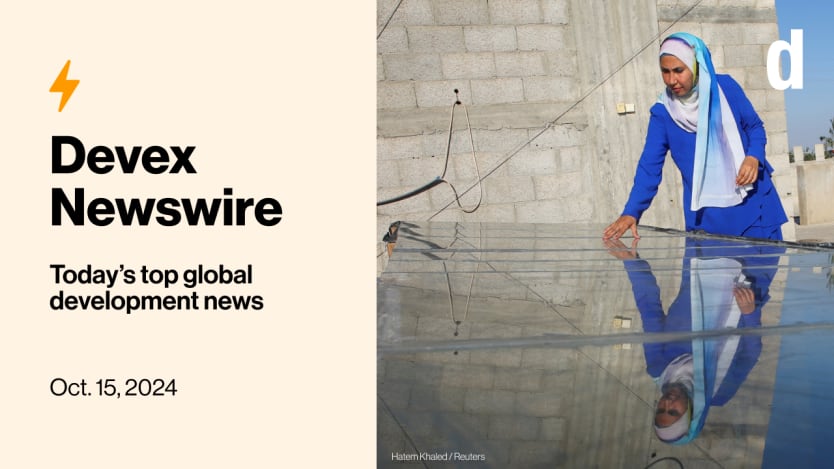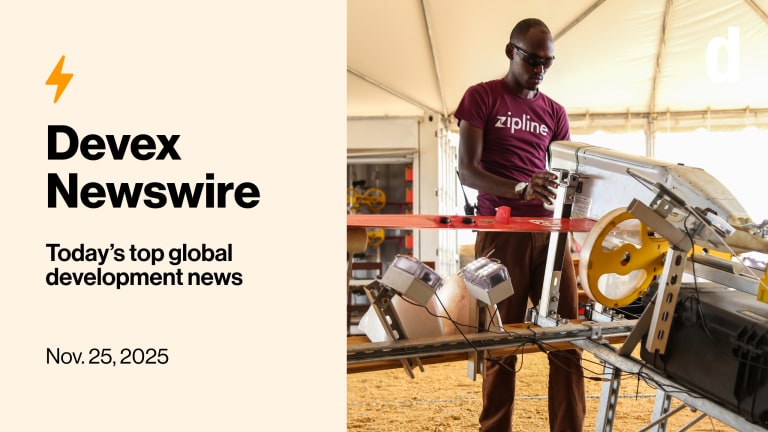Presented by Pivotal

The bombs are still falling on Gaza, but not everyone is waiting out the war to rebuild.
Also in today’s edition: We get a sneak peek into what the U.N.’s new humanitarian czar promised his staff.
+ Join us on Oct. 24 at the Studio Theatre in Washington, D.C., for Devex World. Happening just before the World Bank and IMF annual meetings, we’ll be diving into transformative ideas reshaping global development. We’d love to have you as part of the conversation. Get your tickets now.
The ‘day after’ comes early
This is a preview of Newswire
Sign up to this newsletter for an inside look at the biggest stories in global development, in your inbox daily.
The conflict in Gaza has been somewhat eclipsed by Lebanon and the potential of a region-wide conflagration, but Israel’s military offensive in the coastal strip has not abated. On Monday, at least 20 people, including children, were killed in an Israeli strike at a Gaza school, one of several that day.
For the foreseeable future, the international effort remains focused on stopping the fighting, not on the Herculean effort it will take to rebuild what’s left of the territory.
But while big institutions such as the United Nations and the World Bank are in a holding pattern, smaller civil society groups are taking their chances and going in — and they’re trying to rebuild a warzone in a smart, sustainable way.
Tareq Abu Hamed, a Palestinian environmentalist with the Arava Institute for Environmental Studies, says the organization is waiting for the necessary permits to send solar panels into Gaza. Once they’re allowed inside, they can be installed to help bring electricity, wastewater treatment, and desalination back online as soon as possible, my colleagues Jesse Chase-Lubitz and Colum Lynch write.
In rebuilding Gaza’s infrastructure, Arava is harnessing climate-friendly technologies such as portable solar panels, off-grid solar-powered desalination, and a vertical wall that can treat and reuse water using solar power. The idea is that these technologies are off-grid, and therefore more resilient to volatility.
“Of course, our systems can be bombarded or destroyed. It’s a risk, but we are willing to take that risk,” Abu Hamed says.
While ostensibly admirable, some say the effort is premature. “I think the cost/benefit on this is a tough call,” Jeremy Konyndyk, president of Refugees International, tells Jesse and Colum. “Hard to comment in the abstract but I think that if you’re spending more money upfront to rehab permanent infrastructure than you would to set up a more temporary solution, for the same amount of benefit in the near term, that’s a questionable call.”
Read: While big banks wait for the war’s end, civil society is rebuilding in Gaza
Introductions are in order
Tom Fletcher is trying to put his best foot forward as he introduces himself to staff before he formally takes charge of the world’s premier relief coordination agency in mid-November. Colum saw the internal email the incoming U.N. humanitarian chief shared with staffers and the heads of top aid agencies, in which he vowed to listen, instead of imposing top-down mandates.
“My leadership approach is ‘how do we fix this together?’, not ‘follow me,’” he wrote. “I will start by learning, traveling and listening to you and our partners, to the communities and people we serve. I will be asking you from day one what we do well; what we can do even better; and strive to simplify, not complicate.”
Fletcher, a former U.K. diplomat who served as an adviser to three prime ministers, is the sixth British national to lead the U.N. Office for Coordination of Humanitarian Affairs since 2007. He replaces Martin Griffiths, a former U.N. troubleshooter who stepped down at the end of June, citing the struggles of managing the U.N.’s far-flung responsibilities while grappling with the effects of long COVID.
Fletcher has his work cut out for him. The year 2023 was the deadliest in the modern era for aid workers, with 280 killed in 33 countries. The year 2024 is expected to surpass that grim figure. In Gaza alone, more than 280 aid workers have been killed — the majority of them from the U.N. Relief and Works Agency — since the latest round of warfare began in October 2023.
Exclusive: New UN relief chief introduces himself
Tripling down
Another U.S. agency is hopping on the localization bandwagon. The U.S. President’s Malaria Initiative has set out ambitious targets to provide more funding directly to local organizations and countries while increasing the volume of health commodities it procures from Africa.
PMI is a U.S. government initiative led by USAID and set up in 2005 to control and eliminate malaria, which caused the deaths of 608,000 people in 2022 — the majority of them in Africa, my colleague Jenny Lei Ravelo writes.
Among PMI’s immediate goals is to triple the annual funding it channels to local organizations, including through bilateral agreements, by the end of 2026. It’s a far cry from current numbers, although the baseline has been growing steadily in recent years.
In 2023, PMI directed roughly $24 million — 3.5% of its overall funding — to local organizations and governments. That was triple the percentage of funding that went to local groups in 2020, and it plans to increase that to at least 10% by 2026.
“They’re ambitious. They’re going to cause us to stretch,” Dr. David Walton, who leads the initiative, tells Jenny. “But … we feel that they’re achievable.”
Read: US malaria initiative wants to triple local funding by 2026 (Pro)
Related: Who won USAID’s local contracts in 2023? (Pro)
+ Not yet a Devex Pro member? Start your 15-day free trial today to access all our expert analyses, insider insights, funding data, exclusive events, and more.
Temporary eclipse of the SUN
Another major conference has been rescheduled due to the deadly Marburg virus.
The Scaling Up Nutrition Movement Global Gathering set to be held next month in Kigali, Rwanda, has been postponed to next year due to the Marburg outbreak in the region.
Marburg is a highly infectious and deadly disease caused by a virus from the same family as Ebola. Its mortality rate, which is currently 22% in Rwanda, can reach up to 88%. At least 13 people have died in the country over the last three weeks.
In a statement last week, SUN Movement Coordinator Afshan Khan cited the “health and safety” of participants as the reason for delaying the event.
“This precautionary measure also ensures that the Global Gathering does not complicate the Rwandan Government’s swift and effective response to this outbreak,” she added.
This year’s event, with the theme “NutritiON: Power the Change,” was set to bring together nearly 1,000 people from 66 countries, representing civil society organizations, the private sector, and high-level government leaders. It was timed to encourage political and financial commitments ahead of another major event, the Nutrition for Growth Summit, which is set for March 2025 in Paris.
“To maintain momentum, we will ensure regional consultations, providing an opportunity to discuss and exchange ideas on national-level commitments,” Khan said.
At least one other international conference in Rwanda has been canceled due to the virus. In a meeting with reporters last week, Rwanda’s health minister Dr. Sabin Nsanzimana said that the cancellations were not the government’s decision and noted that other summits were going ahead as planned.
“We don’t see any risk to avoid travels or conferences,” he told my colleague Sara Jerving.
Related: How far are we from a licensed vaccine for deadly Marburg?
+ For the latest insider reporting on global health, be sure to sign up to Devex CheckUp, a free newsletter on the subject.
Under the radar
There are plenty of heavy-hitters in the development space that attract droves of job seekers. But the big names aren’t the only employers in town.
There are many lesser-known but highly active employers that should be on the radar for professionals looking to break into the sector or advance their careers — and my colleague Kristiana Louise Ortega compiled a handy list of 10 of them.
One example: WorldFish, based in Penang, Malaysia, and founded in 1975, is a leading global research organization focused on the improvement of food security, nutrition, and livelihood through aquatic food systems. It’s currently promoting a post-doctoral fellowship on fisheries assessment and technology based in Maputo or Inhambane, Mozambique.
Read: Other development employers to watch out for (Career)
+ Not yet a Career Account member? You can try it out with a free 15-day trial to access all career advice articles, members-only events, our full job board plus salary insights, and much more.
In other news
Turkey is close to finalizing a World Bank loan of up to $4 billion to fund a railway project across the Bosporus strait, with technical details still under discussion. [Bloomberg]
U.N. refugee chief Filippo Grandi warned of worsening crises in Lebanon and Sudan and called for alternatives to border restrictions as global displacement hits a record 123 million. [Reuters]
The International Committee of the Red Cross has urged the protection of Lebanon’s health care system following reports of Israeli strikes affecting medical staff during clashes between Israel and Hezbollah. [France 24]
Sign up to Newswire for an inside look at the biggest stories in global development.








